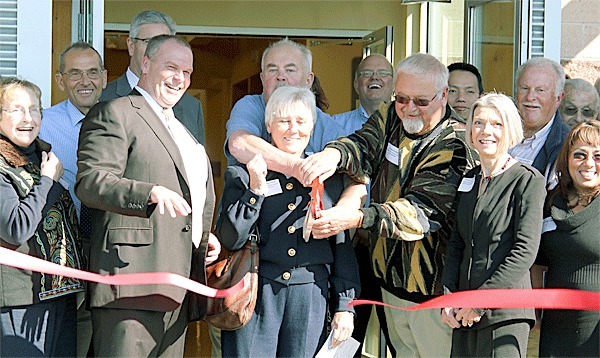Jane Ditton of Oak Harbor shows up three times a week for up to four hours at a time. It sounds like a perfect schedule for a part-time job or volunteer position, leaving plenty of time for other activities.
But the visits to the Puget Sound Kidney Centers of Whidbey Island are not for financial gain or for personal enrichment. These trips to the medical center are the only thing keeping her alive.
Ditton is one of more than 30 patients who rely on the center for kidney dialysis. The tri-weekly procedures flush waste products out of her body, regulate water in her blood and help control her blood pressure.
And now, she has a bigger, brighter facility to go to for care.
The Puget Sound Kidney Centers, a community-based nonprofit, celebrated the opening of its new facility in Oak Harbor Oct. 5 and patients are already lauding the 10,250-square-foot space. The facility is located at 430 SE Midway Blvd.
“It’s a beautiful facility,” Ditton said. “I couldn’t ask for anything better — it’s life giving.”
The organization has four centers in Western Washington and provides more than 85,000 dialysis treatments each year. About 4,600 to 4,700 treatments occurred at the Whidbey Island center last year.
The numbers
The new facility has doubled the number of patients that it will be able to accommodate, and has the capacity to perform 10,000 treatments per year.
One out of seven Americans battles some form of kidney trouble.
Out of that group, patients with the most serious conditions must either receive dialysis or a kidney transplant. Approximately 500,000 people in the United States have end-stage renal disease requiring such intervention.
Once dialysis begins and replaces the lost function of the kidneys, it must be continued for the rest of the patient’s life, or until a transplant takes place.
“With the diagnosis of kidney failure a patient’s life is changed forever,” said Harold Kelly, the president and CEO of the Puget Sound Kidney Centers. “We strive to improve the lives of our patients.”
According to the center, kidney disease presents with few symptoms and is often difficult to detect. However, blood tests can help identify this problem early — and help prevent the progression of a more manageable form of kidney disease to that of failure.
Higher risk
Although kidney disease can strike anyone at any age, African Americans, Hispanics, Pacific Islanders, Native Americans and seniors are at an increased risk.
The two most common causes of end-stage kidney disease are diabetes and high blood pressure. However, trauma, infection or an inherited disease like polycystic kidney disease can lead to it as well.
In addition to providing in-center dialysis care, the center also provides training and support for home dialysis patients and kidney health education programs for the community.
“Our top priority is the care and comfort of our patients,” said Kelly. “We believe quality and accessible patient environments are essential to realizing this goal.”



